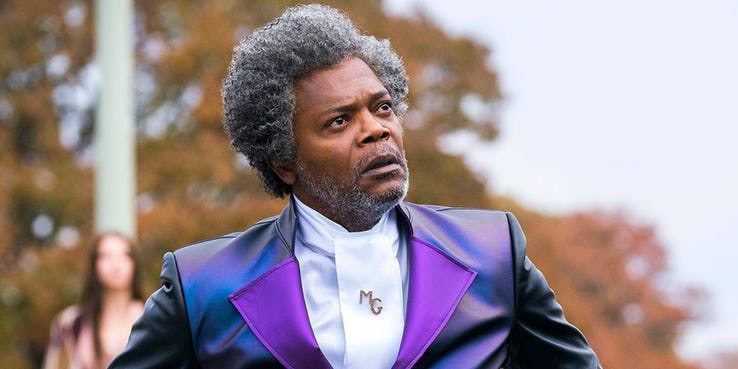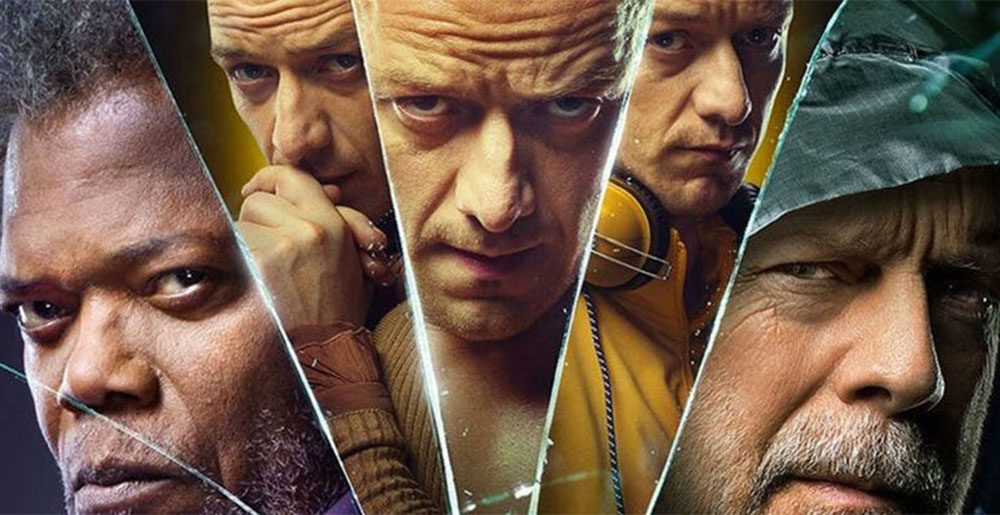It goes without saying, but a whole lot has changed since Unbreakable was released. The superhero movie genre underwent a renaissance that's earned Shyamalan's film - itself, a deconstruction of comic book superhero tropes - a newfound level of reverence and appreciation in the years since its release. At the same time, Shyamalan's career took a dive after his initial success and the filmmaker became something of a laughingstock, mocked for the recurring elements of his work - especially his twist endings - that made his name in the first place.
Then, in a twist worthy of Shyamalan, the storyteller made a comeback, beginning with his 2015 found footage thriller The Visit and continuing on to 2017's Split: a stealthy continuation of Unbreakable and one of his best-received (and most lucrative) films in years. Everyone's been waiting to see if Shyamalan's hot streak continues with Glass, not least of all because it brings the casts from Unbreakable and Split together for (supposedly) one last film. We've rounded up spoiler-free excerpts from the first wave of Glass reviews below, for those anxious to find out what critics are making of the film so far.
The Wrap's Monica Castillo calls Glass a "stylish but shallow sequel", explaining:
Performances aside, “Glass” is a pretty mixed bag of exposition-filled dull moments and pedantic dialogue. Shyamalan, who also wrote the movie, unloads comic-book knowledge at the expense of character development, going so far as to explain what a “showdown” is and having a character give a brief history of the comics medium, which seems extraneous in a world where superhero movies have opened in theaters every summer for the past decade. That moment would have worked in 2000, but nowadays, any kid on an American playground has heard of the Avengers. Despite its flaws, the movie has a fair share of entertaining scenes, usually the ones involving all three leads. However messy, Shyamalan still has a few tricks up his sleeve when tying the threads of these separate movies together.

Mashable's Angie Han expresses a similar sentiment in he review, saying the film "tries and fails to shatter the comic book movie formula":
Glass is M. Night Shyamalan's sequel to his Unbreakable and Split, and like Unbreakable before it, wants to be a deconstruction of the superhero genre. But where Unbreakable was meticulous, re-examining well-worn tropes through well-drawn characters, Glass is uncontrolled. It doesn't so much analyze or update those tropes as it does lampshade them, and call it a day. Perhaps that would've been more forgivable in the early 2000s, when Unbreakable was released, before Spider-Man or Nolan's Batman or the MCU and DCEU. Now, though, it feels downright bizarre for a movie to act as if the same audience that turned Avengers: Infinity War into a $2 billion juggernaut might need a refresher on what Superman is.
Variety's Owen Glieberman is only somewhat more positive, saying the film "holds you without haunting you":
Shyamalan, though, as he proved with “Split,” can still win over an audience, and in “Glass” he’s a poised and confident filmmaker who seizes our attention. Yet the movie, watchable as it is, is still a disappointment, because it extends and belabors the conceits of “Unbreakable” without the sensation of mystical dark discovery that made that film indelible. “Glass” is a sequel that feels more dutiful than necessary. It turns the earlier film’s ominous pop poetry into overexplicit blockbuster prose.
Film's Chris Evangelista is even more critical of the film in his review, calling Glass "a huge, unfortunate step backwards" after Shyamalan's recent successes:
In his past work, [Shyamalan has] displayed a wonderful knowledge of cinematic language, and a masterful control of the camera. But none of that is on display in Glass, which only has a few memorable shots spliced into a visually bland, flat space. This becomes even more noticeable when the director cuts in some deleted scenes from Unbreakable, which look gorgeous, atmospheric, and, well, cinematic. Where did the filmmaker who shot those scenes 19 years ago disappear to? Like Superman exposed to kryptonite, Shyamalan has lost all his powers directing Glass. I can only hope he gets them back soon.
THR's John DeFore is similarly muted in his response, calling Glass a "partly-satisfying conclusion" to Shyamalan's superhero trilogy:
Like Unbreakable and Split, Glass wants its extraordinary feats to be as grounded as possible in the real world. The tension between wish-fulfillment heroics and realism was tantalizing in Unbreakable. Here, it's more confused. Those of us who have steered clear of gossip sites or promotional interviews may find ourselves, after the big showdown Mr. Glass has engineered, not certain what we have seen. Is Glass the least satisfying chapter of an often enjoyable, conceptually intriguing trilogy? Or is it an attempt to launch a broader Shyamalaniverse, in which ordinary men and women throughout Philadelphia and its suburbs will discover their own inspiring abilities? Marketplace realities make the latter more likely. Here's hoping the former is the case.
Collider's Vinnie Mancuso feels Glass reflects Shyamalan's best and worst tendencies as a filmmaker (or, as his pun-y review title puts it, "split personalities"):
[One] of Shyamalan’s worst tendencies is to not let a clever idea just be clever. Glass‘s overall schtick, a cerebral thriller that follows the beats of a comic book, is a smart one, but Shyamalan falls a bit too in love with his own form. He’s not just showing you a cool thing, he needs you to know why it’s cool in context and needs to explain every layer of subtext. By the end of Glass, every single main player has transformed into Jamie Kennedy‘s character in Scream, a cacophony of know-it-all experts shouting at each other - and the audience - about The Rules of comic book storytelling. This is especially grating in 2019, when [your] six-year-old nephew could probably write a treatise on how this stuff works.
Polygon's Karen Han is likewise split (har, har) in her review, saying Glass is a "thrilling yet frustrating end to the Unbreakable trilogy":
In theory, it’s a natural finale. As characters, David, Kevin, and Elijah hinge on an exaggeration of human nature and the difficulty inherent in finding one’s place in the world, with their alignments putting them on colliding paths. Finding a middle between the more aggressive, out-and-out supernaturalism of Split and the internal, emotional stakes of Unbreakable should bring the Eastrail 177 trilogy to a clean close. In practice, however, Glass ends up feeling at war with itself. No easily achievable middle ground exists, particularly not when one of the two extremes, Split, is such a knot of thorns already, as it deals (poorly) with dissociative identity disorder, Stockholm syndrome, and the idea that only those who have suffered deserve to live.
Perhaps Uproxx's Mike Ryan sums things up best when he describes Glass as a "bewildering misfire, yet also strangely fascinating":

There’s a big part of me that loves that Glass exists in the world. I do appreciate that Shyamalan was going for something here, even though that something doesn’t work. It’s almost like Shyamalan was trying to make his own version of The Last Jedi - a meta-deconstruction of what came before; in this case superhero movies - only he got too engrossed in the deconstruction part and forgot to make it entertaining. In a way, Glass feels like a giant middle finger to the very people who would be excited to see Glass. That, on its own, is inherently fascinating... And I want to word this as kindly as possible, but there are sequences in this movie that, how should I put it: let’s just say maybe bring a caffeinated beverage.
On the whole, critics seem pretty mixed to negative on Glass... and yet, it appears many find the film equal parts fascinating and frustrating. That's certainly better than being an uninteresting failure and suggests Glass may yet find a cult following among critics and general audiences alike. It wouldn't be the first Shyamalan movie to do that either; a number of the director's critically-derided movies have their fair share of supporters (see also: The Village) and Unbreakable itself earned a mixed to positive response, upon its initial release.
Either way, it looks like Universal/Blumhouse made the right call in releasing Glass in January. The month is typically a dumping ground for studios and odds are people will be more willing to give Shyamalan's new film a shot now than they would've been, had Glass hit theaters during a far more competitive frame. Those who've been waiting some twenty years to see the Unbreakable sequel may end up disappointed by what Shyamalan's delivered here, but they may want to check it out all the same and find out what they make of his latest eccentric creation.

